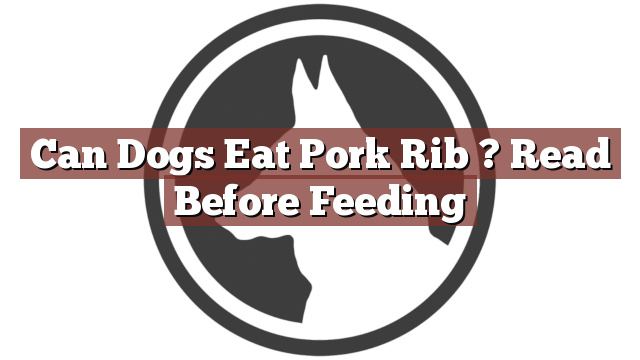Understanding Your Dog’s Dietary Needs
As a responsible pet owner, it is crucial to understand your dog’s dietary needs to ensure they remain healthy and happy. Dogs are omnivores, meaning they have the ability to eat both meat and plant-based foods. However, their digestive system is different from ours, and certain foods that are safe for humans may not be suitable for dogs. Therefore, it is important to be aware of what foods are safe to feed your furry friend and what should be avoided.
Can Dogs Eat Pork Rib? Read Before Feeding
Can dogs eat pork rib? This is a common question among pet owners. The answer, no, dogs should not eat pork ribs. Although dogs are known to enjoy meat, pork ribs can pose several risks to their health.
Firstly, pork ribs are often cooked with spices, seasoning, or sauces, which can be harmful to dogs. Ingredients like garlic and onions are highly toxic to them and can cause severe health issues such as anemia. Additionally, the bones in pork ribs can splinter and cause choking hazards or internal damage if ingested. These bones can also get stuck in the intestines, leading to blockages that may require surgery to remove.
Pros and Cons of Feeding Pork Ribs to Dogs
While pork ribs should generally be avoided, it is important to weigh the pros and cons before deciding to feed them to your dog. One potential benefit of feeding pork ribs is their high protein content. Dogs require protein for energy and to support muscle growth and repair. However, there are other safer sources of protein for dogs, such as lean meats like chicken or turkey.
On the other hand, the cons of feeding pork ribs to dogs outweigh the potential benefits. Apart from the aforementioned risks associated with bones and seasonings, pork ribs are also high in fat. Excessive consumption of fatty foods can lead to pancreatitis and obesity in dogs. Furthermore, dogs may develop an upset stomach or experience diarrhea if they eat pork ribs, especially if they are not accustomed to such rich foods.
Conclusion: Make an Informed Decision for Your Dog’s Wellness
In conclusion, it is best to avoid feeding pork ribs to your dog. While they may be tempting to share with your four-legged companion, the potential risks and dangers outweigh any potential benefits. Instead, opt for safer alternatives that are specifically formulated for dogs and meet their nutritional needs. If you are unsure about what foods are safe for your dog, consult with your veterinarian for professional advice. Remember, making informed decisions about your dog’s diet is crucial for their overall health and well-being.
Thank you for taking the time to read through our exploration of [page_title]. As every dog lover knows, our furry friends have unique dietary needs and responses, often varying from one canine to another. This is why it's paramount to approach any changes in their diet with caution and knowledge.
Before introducing any new treats or making alterations to your dog's diet based on our insights, it's crucial to consult with a veterinarian about [page_title]. Their expertise ensures that the choices you make are well-suited to your particular pet's health and well-being.
Even seemingly harmless foods can sometimes lead to allergic reactions or digestive issues, which is why monitoring your dog after introducing any new food item is essential.
The content provided here on [page_title] is crafted with care, thorough research, and a genuine love for dogs. Nevertheless, it serves as a general guideline and should not be considered a substitute for professional veterinary advice.
Always prioritize the expert insights of your veterinarian, and remember that the health and happiness of your furry companion come first.
May your journey with your pet continue to be filled with joy, love, and safe culinary adventures. Happy reading, and even happier snacking for your canine friend!

